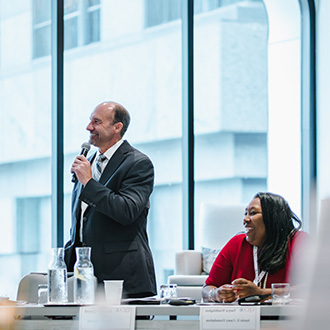CJJA President’s Award
The CJJA President’s Award was created in 2013 to recognize a member who has made a significant contribution through participation in the activities of CJJA including mentoring new directors, participation in semi-annual meetings and active participation on regional and standing committees.
CJJA President’s Award Recipients
2023 – Presented to Anders Jacobson at the CJJA Summer Business Meeting in Philadelphia, PA.
2022 – Presented to Joe O’Leary at the CJJA Summer Business Meeting in New Orleans, LA.
2021 – Presented to Tyrone Oliver at the CJJA Summer Business Meeting in Nashville, TN.
2019 – Presented to Simon Gonsoulin at the CJJA and PbS Awards Dinner in Boston, MA.
2018 – Presented to Chris Blessinger at the CJJA and PbS Awards Dinner in Minneapolis, MN
2017 – Presented to Harvey Reed at the Leadership Institute in Chicago, IL.
2016 – Presented to Kevin M. Brown at the Leadership Institute in Chicago, IL.
2015 – Presented to Kathy Halvorson at the Leadership Institute in Chicago, IL.
2014 – Presented to Cindy McKenzie and Fariborz Pakseresht at the Leadership Institute in Chicago, IL.
2013 – Presented to Susan Burke and Charles Flanagan at the Leadership Institute Meeting in Chicago, IL.
Outstanding Leadership Award
CJJA presents the Outstanding Leadership Award each year to an individual or individuals for their extraordinary leadership to CJJA and the field and their commitment to improving the lives of youth. There is no better recognition for an administrator than to be given this award in recognition of their work by their peers.
Outstanding Leadership Award Recipients
2023 – Presented to Dana Shoenberg at the CJJA Summer Business Meeting in Philadelphia, PA.
2022 – Presented to Lou Serrano at the CJJA Summer Business Meeting in New Orleans, LA.
2021 – Presented to Ellyn Toney at the CJJA Summer Business Meeting in Nashville, TN.
2019 – Presented to John Larivee at the CJJA and PbS Awards Dinner in Boston, MA.
2018 – Presented to Lisa Bjergaard at the CJJA and PbS Awards Dinner in Minneapolis, MN
2017 – Presented to Peter Forbes at the Leadership Institute in Chicago, IL.
2016 – Presented to Sharon Harrigfeld at the Leadership Institute in Chicago, IL.
2015 – Presented to Susan Burke at the Leadership Institute in Chicago, IL.
2014 – Presented to Michael Dempsey at the Leadership Institute in Chicago, IL.
2013 – Presented to Fariborz Pakseresht the Leadership Institute Meeting in Chicago, IL.
2012– Presented to Tim Decker and Kevin Aucoin at the CJJA Summer Business Meeting in Denver, CO.
2011 – Presented to Jane Tewksbury at the CJJA Summer Business Meeting in Kissimmee, FL.
2010 – Presented to Cherie Townsend at the 3rd Annual All Directors Meeting held in Chicago, IL.
2009 – Presented to Bernie Warner and Russell Jennings.
2008 – Presented to Steve Bates.
2007 – Presented to George Sweat.
2006 – Presented to Barry Stoodley at the CJCA Summer Business Meeting in Charlotte, NC.
2005 – Presented to Anne Marie Ambrose and Doug Herrmann at the CJCA Summer Business Meeting in Baltimore, MD.
2004 – Presented to Howard Deyer the CJCA 10th Anniversary Meeting in Chicago, IL.
2003 – Presented to Mark Steward at the CJCA Summer Business Meeting in Nashville, TN.
2002 – Presented to Joyce Burrell at the CJCA 8th Annual Meeting in Charlotte, NC.
2001 – Presented to Alton Lick at the CJCA 7th Annual Meeting in San Diego, CA.
1999 – Presented to the late Donald Wydra.





